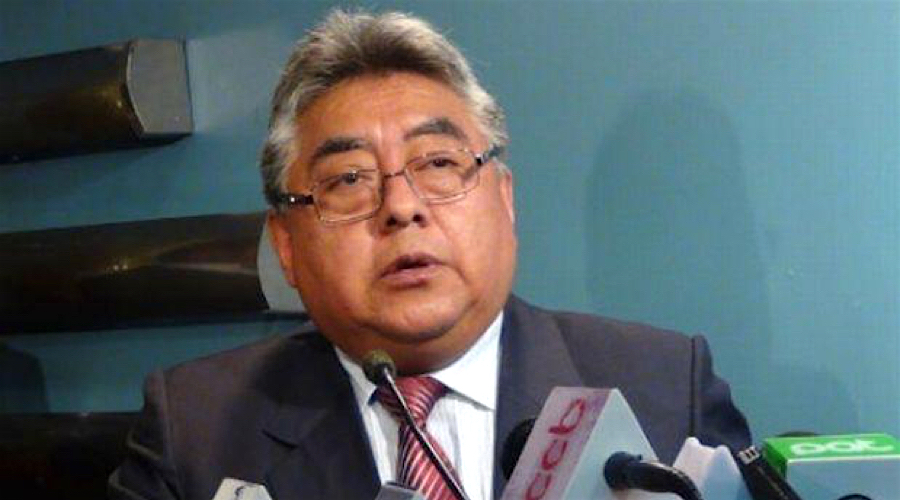Striking Bolivian miners lift roadblock after killing country’s deputy minister

Striking Bolivian miners lifted Friday a roadblock where violent protests took place this week, a day after kidnapping and allegedly torturing and beating to death the country’s deputy interior minister, Rodolfo Illanes.
The miners, who have been demanding more mining concessions, the right to work for private companies, and greater union representation, seized Illanes (56) and his bodyguard early Thursday in Panduro, south of capital La Paz, Peruvian paper El Comercio reported (in Spanish).
He had travelled to the area to negotiate with the miners. His body was found in early Friday morning by the side of the highway that connects La Paz with the city of Oruro, wrapped in a blanket, Bolivia TV showed:
 President Evo Morales called the brutal act a “political conspiracy,” criticizing the “cowardly attitude” of the protesters and insisting on that his government had “always been open” to negotiation, paper La Demajuana reported (in Spanish).
President Evo Morales called the brutal act a “political conspiracy,” criticizing the “cowardly attitude” of the protesters and insisting on that his government had “always been open” to negotiation, paper La Demajuana reported (in Spanish).
Long-running tensions between miners and the government over strict regulations approved in 2014 grew increasingly violent over the past few days. Just Wednesday, two miners were killed in a clash with police, Reuters reported.
After Illanes’ death, Defense Minister Reymi Ferreira broke down on national television.
“This crime will not go unpunished,” Ferreira said, telling audiences that about 100 people have been arrested.

Attorney General Hector Arce called Illanes “a great man and lawyer who served his country,” vowing that justice would be served.
On Twitter, Attorney General Hector Arce called Illanes “a great man and lawyer who served his country,” vowing that justice would be served.
Mining is deeply embedded in Bolivia’s national identity. During colonial times, so much silver was shipped from mines in the southern region of Potosi to Europe that people used to say a bridge of pure silver could be built from the top of Cerro Rico Mountain to the royal palace’s entrance in Spain.
But that boom came at an extremely high price tag — an estimated eight million slaves died in Potosi alone between 1500 and 1800 AD.
By the time mining was nationalized after the 1952 national revolution, tin had long since ousted silver as the main mineral product. In the 1980s a sharp fall in commodity prices led to a shutdown of the government mines, displacing 25,000 salaried miners.
Bolivian mining cooperatives account for about 35% of the country’s mining output. They are tax-exempt organizations and pay royalties at lower rates than other mining companies.
The industry was privatized again in 1990s under neoliberal structural adjustment policies that ended up destroying Bolivia’s miners-led revolutionary trade union movement, once the most combative in Latin America.
When Morales, South America’s first indigenous President, took office in 2006, he immediately hiked mining taxes for foreigners and nationalized the country’s key natural gas industry. He also expropriated the telecommunications and electricity sectors, and seized several assets, including those of Vancouver-based South American Silver Corp. (TSX:SAC) in 2012, and Glencore’s (LON: GLEN), which recently announced it was taking Bolivia to an international court over the issue.
Bolivian mining cooperatives account for about 35% of the country’s mining output. They are tax-exempt organizations and pay royalties at lower rates than other mining companies.
Though rich in mineral and energy resources, data from the Unicef shows that Bolivia is one of the poorest countries in Latin America and the weakest economy in all of South America.
{{ commodity.name }}
{{ post.title }}
{{ post.date }}




4 Comments
Restless Boomers
Yes, despite all the mineral wealth that has been extracted, Bolivia remains one of the poorest countries in Latin America. Isn’t corruption, greed and avarice just great? How is it that the extremely wealthy ruling elites are so happy and the lowly miners so pissed off?
Mark Harder
Tragedy in a tragic land. Has Bolivia benefited from the new taxes and nationalizations? If so, how? If not, what explanation does the Morales government offer? Legitimate reasons, or the usual excuses in such cases?
Kenneth Viney
Socialism does not work. Venezuela and Athens has proved that once and for all but slowly Canada and the US are moving in that direction by the practice of Progressive liberal policies. The Pilgrims and the Israel tried it for a while then had the sense to nip it in the bud. The road to hell is paved with good intensions.
Kenneth Viney
You mention greed and corruption as the reasons Bolivia is poor and is so doing you show you are a socialist. The best economic system is a capitalist system and greed makes it work so well. The product of socialism is corruption. Chevez’s daughter has over $ 1 billion salted away according to MUD documents. The more Govt control you have the less liberty and more corruption. Look at Mexico. Govt controls Pemex, Comision de Electricidad, and a 1000 agencies that should be privatized. If China does not privatize it’s Govt banks and industries it will also fail as it cannot rout out all the systemic corruption in a life time.